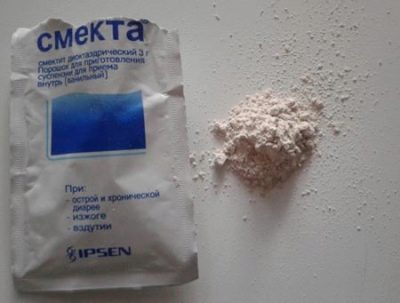"Smecta" during pregnancy: instructions for use
During pregnancy, many women feel worse. They have such unpleasant symptoms as heartburn, diarrhea, nausea, bloating and other ailments. The cause of many of them is the disruption of the functioning of the digestive system, caused both by a change in the level of female hormones and an increase in the size of the uterus. At first, doctors advise expectant mothers to correct nutrition, but if this does not help, they resort to medications approved during pregnancy, for example, they prescribe Smekta.
Features of the drug
The drug is produced by the French company Ipsen Pharma in two dosage forms. One of them is a gray powder with a vanilla scent, packed in portion bags, designed for one reception. Pouring it into the water, get a muddy gray liquid with an orange or vanilla flavor.
These bags are sold at 10 and 30 pieces in a pack, stored at temperatures up to +25 degrees, and their shelf life is 3 years. This drug can be easily purchased at a pharmacy without presenting a prescription, paying about 150 rubles for 10 sachets.
The second form of "Smekta" is represented by a ready-made suspension, also packaged in sachets for a single dose. This medicine is thick and uniform, gray or white-yellow in color, smells of caramel.
This drug is also an over-the-counter remedy, and the price of one package containing 12 sachets is about 300 rubles. Store this medicine at home should be at room temperature, and its shelf life - 2 years.
Both forms of Smekta contain a substance called smectite dioctahedral as an active ingredient. Its dosage is in one portion bag of 3 g. Dextrose and sodium saccharinate are the supporting components of the powdered drug. Vanillin is additionally included in the composition of vanilla powder, and the orange preparation contains orange and vanilla flavors.
In the finished suspension, sweetener serves as sucralose, and other inactive components are represented by xanthan gum, caramel flavoring, potassium sorbate, purified water, ascorbic and citric acids.
How does it work?
The active component "Smekta" refers to aluminosilicates and is characterized by a special structure, thanks to which the drug is able to:
- absorb toxic compounds that are ingested with food;
- adsorb pathogenic bacteria and viruses from the intestinal lumen;
- stimulate the formation of mucus intestinal cells;
- connect with glycoproteins that are in the intestinal mucus, then envelop the intestinal walls;
- enhance the barrier function of the intestinal mucosa;
- increase the ability of mucus to protect the digestive system from toxins, bacteria, acids and other harmful substances.
If you do not exceed the dosage of the drug, "Smekta" does not inhibit intestinal motility. The drug is also not absorbed into the intestinal wall, even if it is damaged or inflamed.
The ingested suspension is not able to penetrate the blood and leaves the digestive system unchanged, having absorbed various harmful compounds.
Is pregnant allowed?
"Smektu" refers to drugs that are allowed in the period of carrying a child. This tool is prescribed both in the early period and in 2 or 3 trimesters, since smectite does not have any negative effect on the course of pregnancy and the condition of the infant.
But, although the medicine is safe for both the woman and the fetus, the expectant mother should take it only after consulting a specialist.
In some cases, taking "Smekta" will not help get rid of diarrhea or pain, so the doctor will prescribe another treatment. In addition, with vomiting and diarrhea, “Smekta” is often supplemented with other drugs, for example, “Regidron” to replenish lost salts.
Given the effect of "Smekta", this medication is most often prescribed for diarrhea caused by various causes - overeating, viral infection, allergic reaction, use of stale food, bacterial intestinal damage, strong feelings, medication and so on. No less popular is this drug for bloating, heartburn, vomiting and discomfort in the intestinal area. In the first trimester, Smecta is recommended to alleviate the manifestations of early toxicosis.
Side effects and contraindications
The drug should not be taken by women with a tendency to constipation, since this is one of the frequent side effects of "Smekta", often arising even if the doses prescribed by a doctor are observed.
In the case when constipation has occurred after taking the medication, it is first recommended to reduce the dosage, but if the problem persists, further use of Smekta will have to be abandoned.
Occasionally, medication leads to vomiting or severe flatulence, which also requires the suspension of the suspension. Although in very rare cases, the drug can provoke allergies, for example, pruritus or urticaria. With such symptoms, use "Smektu" further also can not.
According to contraindications indicated in the instruction, “Smekta” should not be used if intestinal obstruction is suspected.
Such a medicine is prohibited in case of hypersensitivity to simethicone or any auxiliary ingredient, and is also not recommended for hereditary diseases when carbohydrate absorption is impaired. Do not be treated "Smektoy" and with hemorrhoids, which often occurs in women in the position.
How to use?
According to the instructions for use with most indications "Smekta" taken for 1-2 hours before meals. If the woman revealed esophagitis, then the drug should be drunk after meals.
When using the powder, it is diluted with pure water in a volume of 1/2 glass per bag. In this case, the drug dissolves partially, forming a suspension, and if it is left for some time, the drug particles will settle to the bottom of the container. When mixed with water, the consistency is not very pleasant (due to undissolved particles), therefore It is permissible to dilute "Smektu" with juice, milk, jelly or any other liquid.
At one time they usually take one bag of "Smekta", but in some cases, for example, if the diarrhea is acute, the medicine is taken immediately by 2 sachets.. The drug is drunk three times a day, that is, a woman can take 3-6 bags per day, depending on her condition and the doctor's recommendations. Do not exceed the single and daily dose of the drug (especially in the later periods), as this will lead to constipation.
How long to take “Smektu” to the expectant mother should also be clarified with your doctor. Usually the medication is prescribed for a short course of time - for 3-7 days. As soon as the condition of the woman improves, the medicine can be canceled.
However, if diarrhea is the cause of use, taking “Smecta” is recommended for at least 3 days, even if loose stools no longer occur. More than one week, the medication is usually not prescribed, so as not to provoke dysbacteriosis.If after a 7-day reception, flatulence, discomfort, pain, changes in stool and other signs are still there, you need to re-seek medical attention.
Reviews
Most expectant mothers call "Smektu" an effective tool that helped them with intestinal infections, overeating, poisoning and other problems. The form of release of the drug is considered convenient, the effect of the drug is quite fast, and side effects are noted very rarely. Among the advantages of "Smekty" also indicate its natural origin, lack of absorption in the intestines and safety for the crumbs in the mother's stomach. Another advantage of the drug include the absence of addiction and portion packaging.
Among the minuses "Smekty" often mention the appearance of constipation, which contributes to the slow intestinal peristalsis during pregnancy. Many expectant mothers also do not like the taste of the drug, since the insoluble particles of the powder are present in the suspension. Another drawback of "Smekta" is the effect of such an agent on the effectiveness of other drugs, which is why a 1.5-2 hour break should be taken between taking this sorbent and any other drug.
What to replace?
If you need to replace “Smektu” with another medicine, the expectant mother can use another drug based on smectite, for example, with "Neosmektin" or "Diosmektit". Both drugs are presented in powder form, packaged in sachets. Each bag contains 3 grams of smectite; therefore, such agents are full analogs of Smekta and can be administered with the same indications. And since they are produced by Russian manufacturers, these medicines are slightly cheaper.
To replace the "Smekta" in many cases suitable and other drugs from the group of enterosorbents. For example, in case of poisoning, functional indigestion or allergic reaction, the doctor may prescribe «Polysorb MP ". The main component of such a powder is colloidal silicon dioxide.
No less popular sorbent is Enterosgel. Due to its special porous structure, it helps to get rid of toxins, bacteria and various toxic substances. This paste is allowed during pregnancy and can be used in the treatment of any intoxication, intestinal infections and poisoning.
Read more about the features of taking the drug "Smekta", see the following video.






















